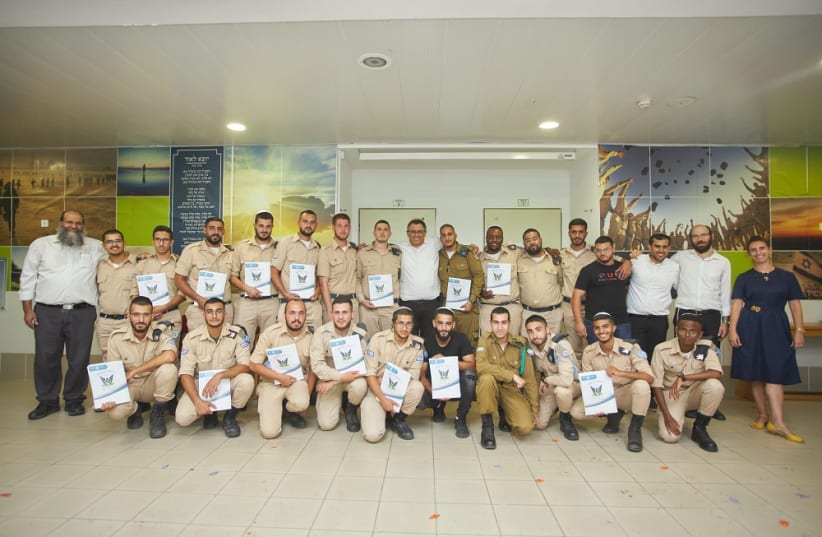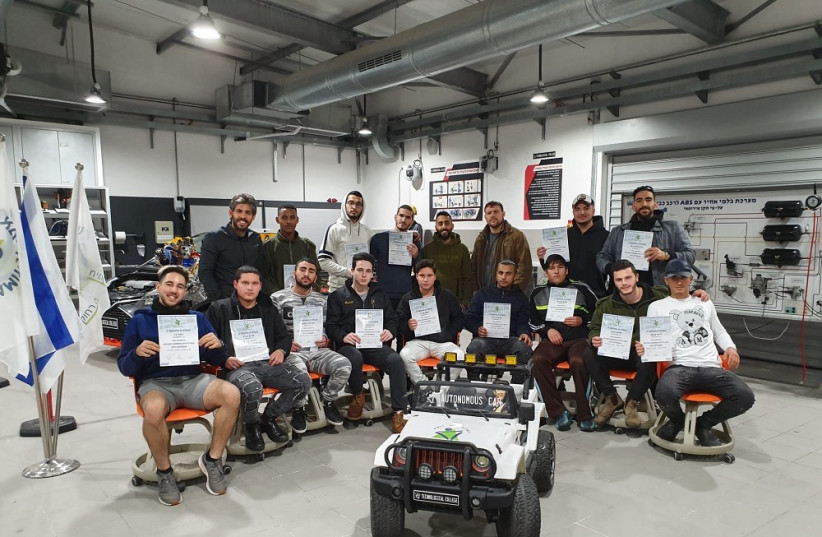"We don't ask why, we ask how - how do you deal with the challenges you face?" Zuri Levi, Principal of the AMIT Tiferet Gur Arye Pre-Military Technology Junior College recently told The Jerusalem Post.
This is the motto that the young men of the pre-military technological junior college live by. This unique school is part of AMIT, Israel's premier educational network, comprising of some 110 schools with over 40,000 students throughout the country.
"Our goal stretches beyond providing basic education. We have a vision that sees a student, a family man, a professional who is dedicated to the traditions of the State of Israel," Levi said. "Our uniqueness is that we provide a hierarchical, spiritual environment that prepares our students for a family life and a life of meaningful service."
The pre-military technology junior college offers a two-year educational program for grades 13-14, specializing in electronics, computers, and information technology. The program combines technology studies and workshops together with studies of the Torah and Jewish history as well as tours around the Land of Israel. Graduates of the program receive a Certificate of Practical Engineering and continue on to serve in the Israeli Air Force.
"They leave with a diploma as well as with values and personal empowerment so that after meaningful service in the IAF, at the age of 23, with experience and a profession in hand they can integrate into the workforce, into hi-tech," Levi said. "We provide them with a jumping board to a better life.”
In fact, many of the students at the junior college hail from the social and geographic periphery. This program provides them the opportunity to overcome these challenges and integrate into Israeli society.
As such, Levi said he sees the program as a "process" from youth into adulthood.
"We know that youth at these ages have a difficulty in creating stability and deciding what to do with their lives. Especially today in a world where youth jump from one thing to the next," he said. "In our educational view, we accompany them from the age of 18 to 25 and we try to help at every transition."
This holistic approach has seen the junior college grow from just 20 students in its first year to over 150 students now in its 8th year.
"It is wonderful to see these young men, where they started and the challenges they faced, and then to see them integrate into senior positions in the IAF," Levi said.
Hi-tech in the IAF
"The IAF is one of the largest hi-tech companies in the Middle East," he added. "Every plane needs a very large technological support team and so our graduates carry a very large responsibility at a very young age and are able to complete their work in the best possible way."
It is this vision that drove Raphi Maimon, Principal of AMIT Hammer in Rehovot to first establish the junior college.
“I realized how limited the options were for graduates of general religious high schools,” he told The Post. “These students, who did not find their place in the classic mechina pre-army programs or Hesder Yeshivot, sometimes found themselves at junior colleges, but felt that by the time they reached their army service, they had limited motivation and had not gained significant values that their counterparts had acquired in mechinot and yeshivot.”
The sense was, he explained, that following their army service, they were not ready to begin real life or build a family.
“The goal of our program is to prepare them not only for their IDF service, but for life. I understood that the time had come to create a new and unique model, combining Torah study, values, vocational education, preparation for life and the ability to sustain themselves and create good careers in the future,” he said.
As such, Dr. Amnon Eldar, Director General of the AMIT Network, told The Post that pre-army technological junior colleges are an “educational start-up” to promote students from Israel’s social and geographic periphery and enable them to serve a meaningful army service, receive significant training for the job market, and, most importantly, build stable homes and families, so they can “contribute to society, realize their dreams and become leaders, prepared for the world of tomorrow.”
“Our graduates work with the very best aircrafts, including F-35 planes, on the Iron Dome system, and more, and are involved in saving the lives of Israelis through gaining proficiency in the IDF’s most advanced technologies,” he said.
According to Eldar, AMIT’s primary task is providing its students with values-based education for life, alongside critical 21st century skills.
“The combination of professional training and values-based education is the ideal model to accomplish this goal,” he said. “In this way, we provide students, who are lacking proper preparation and support from their homes, a professional, values-based, supportive environment, paving the way for their future success and helping to change and better Israeli society.”
Today, AMIT operates junior colleges across Israel, in collaboration with various units of the IDF. The educational network just recently opened a pre-engineering program in Ma’aleh Adumim, in collaboration with the navy.
“We are seeing that the need and demand for such programs continues to grow,” he said.
In fact, Moshe Uziel, vice principal of AMIT Kfar Blatt Youth Village and founder and principal of the Gloria and Henry I. Zeisel and Family Pre-Army Technology Leadership Junior College in Petah Tikvah – the first school of its kind, echoed these sentiments.
Educate to values
"As is written in the Book of Exodus, 'And the Spirit of G-d shall fill him, in intelligence, in wisdom, and in knowledge and in all manner of workmanship.' This explains what the role of the Father is: to educate to values, to the love of man, but also to the acquisition of a profession," Uziel told The Post.
It is this vision and belief that led him to establish the first academy of its kind some 12 years ago as a “holistic compliment” to the Technology Academy.
"We feel it is right to see a child and answer all his needs with regards to education, but also with regards to values, leadership, and preparation for a life of meaning," he said.
As such, similar to the Junior College in Rehovot, the school aims to provide a holistic educational model that includes practical studies for grades 13-14 in the automotive fields, along with a preparation program for a life of meaning. The 1.5-year long program places an emphasis on building independence and developing personal responsibility as well as leadership and social involvement alongside strengthening Jewish identity, connection, and belonging to Israeli society.
“The preparatory program aims to train the next generation of commanders of the Technology and Maintenance Corps in the IDF,” said Uziel. “In recent years we have seen the fruits of our investment.”
Indeed, according to Uziel, over 70% of the commanders in the IDF School of Automotive Professions are graduates of the program.
"Our vision is that our graduates will love the people of this land and their country and will continue to engage in technology out of a sense of mission to the people and the State of Israel,” he said.
Uziel understands the importance of this vision all too well. A graduate of the AMIT Kfat Blatt Youth Village himself, he went on to serve in the army for 10 years before returning to establish the program.
"I was a student here at the youth village, but I arrived to the IDF without this holistic framework," he said. "Yet, throughout my time in the army whenever I needed help in my life, I came back to the Kfar for mentoring and guidance."
The graduate returns
AMIT Kfar Blatt serves as a home to hundreds of youth who cannot live at home for a variety of reasons, and provides them with a loving and nurturing home environment, academic studies, clubs and extra-curricular classes and therapies.
After Moshe completed his army service, Amiram Cohen, the director for the AMIT Kfar Blatt Youth Village, asked him to return and establish a program that places an emphasis on technological education and Jewish values, bringing his experience and vision to the school.
"I immediately answered the call to be able to give back to the Kfar, and I am not alone. There are over 20 other alumni that have returned in order to teach in the program and help other generations of youth develop skills and a profession and put them on a track towards a meaningful life,” he said.
Shoshan Shmuel, a graduate of the program said that he credits the program with instilling in him the inspiration to face challenges head on in order to succeed in life.
“The mechina provided me with the motivation and the skills needed to succeed throughout my life and in my studies as an automotive practical engineer,” he said. “I know that who I am today is due to this place, thanks to what I’ve learned here and the professional tools and also the personal skills I’ve acquired here.”
Shmuel is currently serving in the army but said he feels that the Junior College is a place he will always feel welcome and grateful for.
“The school provides me with the confidence that no matter what will happen, they will help me and promote my needs and no matter what I want to do with my life, I will always have a place to turn to,” he said.
This article was written in cooperation with AMIT


